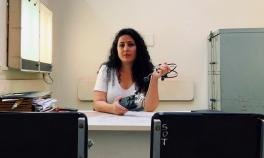What does it mean to be a woman with Turner syndrome?

Graduate student examines language, gender identity and medical treatment in Brazil
Ashlee Dauphinais was unsure about turning the focus of her doctoral research to women with Turner syndrome, a rare genetic condition in which a female baby is born with a partially or completely missing X chromosome.
Women with Turner syndrome don’t normally go through puberty and can have underdeveloped ovaries and short statures. They can feel like second-class women, she said.
The new dissertation would examine how these women understand themselves within society and the medical community. She was particularly interested in what it means to be a woman with Turner syndrome in Brazil, where she said women’s bodies are prominent – both in the public eye and in national understandings of medicine and beauty.
Dauphinais, who was diagnosed with Turner syndrome as a child, was hesitant about being open on a subject so personal to her. But thanks to encouragement from her advisor and several faculty members in the Department of Spanish and Portuguese, she decided to pursue the topic.
Through the early stages of her fieldwork, Dauphinais learned her own diagnosis gave her a unique lens to her research and allowed her to connect with interview subjects at a deeper level.
“It would be harder for someone else to do this work,” she said. “I realized that if I don’t do it, no one else would.”
Dauphinais, who launched her research in 2015, was among 18 graduate students recently awarded an autumn 2019 Presidential Fellowship — the most prestigious award given by the Graduate School at Ohio State. The fellowship provides students with one-year of full-time financial support in their final year of dissertation work.
“It means a lot,” Dauphinais said. “It’s also validating to see your project recognized and seen as important by the university.”

Her advisor, Anna Babel, said Dauphinais stands out among doctoral students because of the innovative nature of her research topic, her comprehensive academic preparation, her extensive experience in Latin America and her uncompromising work ethic.
“She is well-positioned to make a contribution to the literature on gender, language and intersex populations in Brazil due to her academic strengths, her technical and linguistic skills and her experience in and understanding of Latin America,” Babel wrote in Dauphinais’ recommendation letter.
Dauphinais’ doctoral work brings her back to when she was a premed major for her bachelor’s degree at St. Joseph’s University in Philadelphia. She initially thought of becoming an endocrinologist, but she later switched her major to Spanish and international relations to focus on her passion for languages.
Dauphinais earned her master’s degree in linguistics from the University of Puerto Rico, examining linguistic structure in Cuban and Puerto Rican Spanish.
Dauphinais came to Ohio State in 2014 to initially build off of her previous master’s work for her doctoral research, but she decided to change topics after her first year at Ohio State. She wanted to focus on a project that could have an impact beyond her field and could be shared beyond academic circles.
She noticed there wasn’t a lot of research on women with Turner syndrome and how they saw themselves within society and the medical community. Brazil, where women’s bodies are frequently on display and a subject or private and national discussions, offered an interesting backdrop for the study. She also recognized an opportunity to bring a linguistics angle into the work, studying voice pitch and the discourse surrounding health care and femininity.
For Dauphinais, the project allowed her to return to her initial interest in health care and public health but through the lens of social science, linguistics and anthropology.

She spent three months in Rio de Janeiro in 2016 for her fieldwork, connecting with support groups for women with Turner syndrome and several doctors whose research is on the genetic condition. She also served as a visiting scholar with the Federal University of Rio de Janeiro.
She spent last year in Brazil as part of a Fulbright-Hays fellowship for her doctoral research. She interviewed women to learn more about their experiences and how they were treated by friends, family, educators and health care professionals. She interviewed doctors to understand how they communicated with women with Turner syndrome. The conversations were eye-opening.
“My experience with Turner syndrome has been very different than some of my research participants,” she said. “It helps me get a more global understanding.”
She also gained insight into how health care systems work and how levels of education and socioeconomic status can affect how patients are treated, understood by doctors and how those can have long-term effects.
Dauphinais is now back at Ohio State and will spend the next year focused on writing her dissertation thanks to the Presidential Scholar fellowship. She is interested in writing a book from her research, providing academics, health care professionals and family members a greater understanding of women with a genetic condition that occurs in about 1 out of 2,500 young girls worldwide.
“It could be a resource to not only academics but also people who have a connection to Turner syndrome,” she said.
